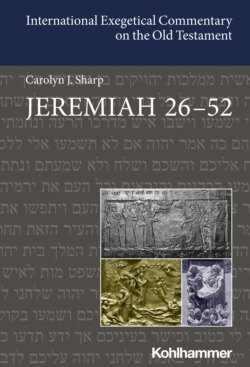Читать книгу Jeremiah 26-52 - Carolyn Sharp - Страница 30
На сайте Литреса книга снята с продажи.
Notes on the Text and Translation
Оглавление26:1a Words, clauses, and lines in the MT that are not represented in the LXX are marked by square brackets. For more information, see the Translation Practices section in the Introduction.
26:5a The adverbial phrase השכם ושלח, which occurs sometimes with an introductory waw that lacks translational value, signals repeated, persistent, or urgent sending. In English, “urgently” lacks the sense of durative time, and “repeatedly” and “persistently” can imply intense activity over a relatively recent or short period of time. But the occurrences of this phrase in Jeremiah suggest that Yhwh has sent the prophets to a recalcitrant people “early and often” for many generations. See 25:3–5, where the twenty-three years that Jeremiah has received the word of Yhwh would seem to be in the foreground of a history of communal malfeasance that stretches many generations further back. Thus the adverb “ceaselessly” is the best choice in English, for it subtly signals durative action over a protracted period that may even have started at the beginning of remembered time. If the tone of Yhwh is to be heard as aggrieved or impatient, “ceaselessly” works well to convey that too. On the function of the infinitive absolute as adverb of manner and as expressing continuous or repeated action, see Williams, Hebrew Syntax, §§204, 206. On every syntax issue addressed in Williams, a footnote cites relevant sections from major English-language reference grammars of Biblical Hebrew published from 1907 to 2006.
26:6a The Hebrew phrase היה לקללה is best rendered “to become an execrated thing” rather than “to become a curse” or “to become an object of cursing.” “To become a curse” would suggest that the power of mediating a curse inheres in the object (here, the execrated temple and Jerusalem), which is not accurate. “To become an object of cursing” suggests the decimated Jerusalem will attract new curses heaped upon its ruins, which is also not accurate. To become “an execrated thing” foregrounds the injury done by past cursing—in this case, the punishment Yhwh will have brought upon Jerusalem. It connotes not new harms but the fear and repulsion that the exemplar will evoke in those who see or remember it.
26:7a JerLXX renders הנבאים with the pejorative term “false prophets” (οἱ ψευδοπροφῆται) in vv. 7, 8, 11, 16. The same translation practice is visible where the LXX translator renders JerMT 6:13; 27:9; 28:1; 29:1, 8.
26:9a חרב qal can mean to be destroyed, to be in ruins (HALOT 1:349). Because the root evokes “sword” (חֶרֶב), the more robust sense of “to have been ravaged” best captures the semantic valence here.
26:10a Inserting בית with mss of the LXX, Peshitta, Vulgate, and Targumim, on analogy with פתח שער בית־יהוה החדש in 36:10.
26:12a The preposition אל can mean “to, towards” or, less often, “against” (IBHS §11.2.2).
26:13a As a feminist translator, I decline to inscribe theological androcentrism in this translation by using “he” or “his” when referring to the deity. Where needed for clarity, I supply “Yhwh” or “Yhwh’s” in parentheses.
26:18a “Mountain of the House”: the Temple Mount in Jerusalem.
26:19a The modifier גדול in a negative semantic context is rendered as “ruinous” throughout this commentary (26:19; 30:7; 32:37, 42; 36:7; 44:7; 48:3; 50:22; 51:54).
